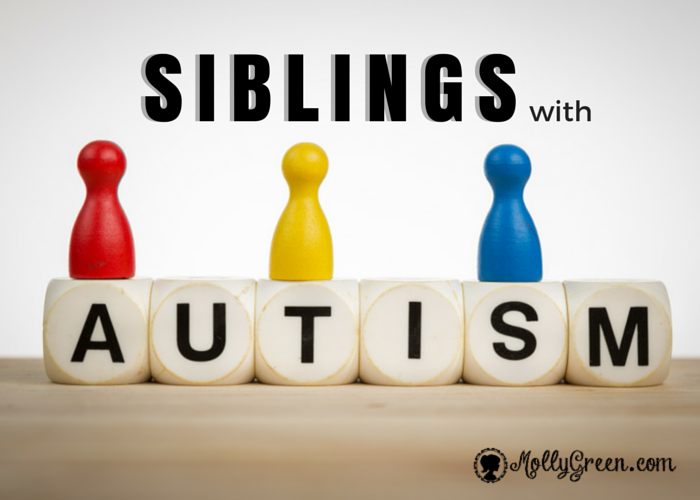By Gabriella Smith
“Doesn’t anyone know how hard it is for the siblings of an autistic kid?” So begins one of my journal entries from several years ago. “As well as not getting as much attention, they’re the ones who have to dodge flying pencils (yes, truth really is stranger than fiction); work in a house full of screaming, and make all the dietary changes along with him. Oh, and also hearing the same thing a million times.”
Well, regardless of the pessimistic thoughts going through my 14-year-old head at that time, I’ve found that life with a special-needs sibling can be more than just an annoyance. When we have the right perspective, even everyday irritations can become blessings. (Extra patience, anyone?)
If you have a sibling—or more than one—with special needs, I hope I can be an encouragement to you. And if you’re a mom of both neurotypical and special needs children, I hope I can show you that dealing with a special needs child doesn’t “ruin” your typical children, but can instead bring the whole family closer together.
First, here’s a quick summary of my family’s journey with autism. In October 2007, my brother Spencer was diagnosed with Asperger syndrome (high-functioning autism.) He was nearly 8-years-old. At that point I was 12 and the oldest of five children (now six.) My siblings and I had not heard of Asperger’s, and we had absolutely no clue what we were in for.
This was a roller coaster, hold-on-for-your-life, what’s-going-on world. We soon completed Autism 101 and extensive honors classes in Asperger’s Studies (just kidding.) But we did learn quite a lot those first few years.
If I had any vague notion of what autism was, it was a kid sitting in a room alone, unresponsive, and unable to even speak. That wasn’t my brother at all. In fact, sometimes we thought there was a little too much talking going on …
Here’s what Autism Speaks an autism awareness group, has to say about Asperger’s:
“Asperger syndrome is an autism spectrum disorder (ASD) considered to be on the ‘high functioning’ end of the spectrum. Affected children and adults have difficulty with social interactions and exhibit a restricted range of interests and/or repetitive behaviors. Motor development may be delayed, leading to clumsiness or uncoordinated motor movements. Compared with those affected by other forms of ASD, however, those with Asperger syndrome do not have significant delays or difficulties in language or cognitive development. Some even demonstrate recocious vocabulary—often in a highly specialized field of interest.” 1
Something about that description sounds a bit familiar. We joke sometimes that we don’t need it to be April to be Autism Awareness month for us. We’re already aware of it. (A little bit of friendly humor often helps diffuse the stress of having a special needs family member.)
Seriously, though, my brother is incredibly smart. He can fix just about any problem we have with the computer. He loves science and knows a lot about various subjects. But he does have trouble with social skills; recently he called a computer game that involved social interaction “his worst nightmare.” He certainly doesn’t have trouble talking. One of the things about this syndrome, in fact, is it’s hard for him to stop. Plus, he has some physical symptoms, too, like sleep problems.
To try to relieve his symptoms, and help with these behaviors, our entire family has gone through diet changes, various therapies, countless doctor visits, supplements, and medications, and a lot of ups and downs. Some days are really good. Others are really, really bad.
But, this journey has taught us much more than we’d ever have learned if he didn’t have autism. If you are in a similar situation, I’d like to tell you five important things you will learn:
- You will learn patience beyond what you could ever dream.
I think most people would agree that it’s hard to be patient even with neurotypical siblings, but siblings with special needs can be even harder to get along with. I’ve got to admit that I still have those days when I just want to scream, “Why can’t you just stop talking?!” That feeling doesn’t always change, but what can change is how we react to this frustration. And having to practice patience can definitely be a positive “side effect” of having a special needs sibling. Having patience comes in very handy, whether you’re interacting with a special needs sibling, a grumpy toddler, or someone just having a bad day. Plus, it’s a trait God wants us to have.
- You will learn to have compassion for others with disabilities or those who are going through hard times.
One way we’ve seen this play out is with our neighbor who has a mental disability. While her problems are not exactly the same as my brother’s autism, we already have experience around someone who isn’t “normal.” It’s also just easier to relate to people who are facing other kinds of medical or emotional difficulties. When you’ve experienced the difficulties of watching a family member try different therapies, diets, medications, or whatever else, you can empathize with others who are going through the same thing, even if their diagnosis is nothing like your sibling’s.
- You will learn to look on the bright side of things.
Although things are better now, my brother used to have a lot of what we called rages—full blown tantrums, complete with screaming and crying. Sometimes they would last for only a short time, sometimes for nearly the whole day. Neither was very pleasant.
So now in our house, a common saying is, “He ain’t screaming!” That sounds funny now that it’s written out, but the concept is true; looking at the day from the perspective of, “It could be worse, but it’s actually pretty good right now,” shows us just how good things really are. As the popular ’40s song puts it, “You’ve got to accentuate the positive!” Or, as Solomon puts it, “A merry heart doeth good like a medicine” (Proverbs 17:22b).
- You will become a very important person in your special needs sibling’s life, and they will become very important in yours.
Though he does still drive me crazy sometimes, my brother is one of my very best friends. We tease each other (in a playful way), do things together, and like to talk about each other’s interests (now I know about vintage Ferraris, and he knows about Olympic figure skaters). Life would be so boring without him to talk to. And, on his side of the equation, it’s been so good for him to interact with us. He can’t stay in his own private world all the time when he has siblings to talk to. We need each other!
- You will learn what unconditional love means.
Just loving your special needs sibling for who they are is one of the very best things you can do for them. It’s true; sometimes they can be really hard to get along with. It doesn’t always feel like they deserve to be loved (and in all honesty, they sometimes probably feel the same way about us).
But, when we choose to treat them well anyway, it’s a little picture of how much God loves us, no matter how unlovable we feel. When we choose to love them, no matter how bad the day is that they are having, we show God’s unconditional love to them. At the end of the day, isn’t our love for them what really matters?
Gabriella lives in the beautiful Pacific Northwest and enjoys figure skating, photography, and spending time with her family. She also loves learning about all sorts of things—from neuroscience to foreign languages. Gabriella is a Class of 2013 homeschool grad and is now exploring the exciting world of life after graduation.
Endnote:
1- http://www.autismspeaks.org/what-autism/asperger-syndrome
Copyright, 2014. Used with permission. All rights reserved by author. Originally appeared in The Old Schoolhouse® Magazine, the family education magazine, July/August 2014. Read the magazine free at www.TOSMagazine.com or read it on the go and download the free apps at www.TOSApps.com to read the magazine on your mobile devices.






This describes my 8yr old Son who has High functioning Autism and my neurotypical 15 yr old Daughter. We have had some pretty intense times with him and I’ve worried how she is going to turn out after she grows up. But, I see a compassionate young lady who loves and adores her brother. She has had to put him first, have patients and learn flexibility out of necessity. By doing that she has grown into a remarkable young lady that is the apple of his eye. He loves her so much and their bond is super special. So, on days that I worry I try to remember all the positives and then the worries slip away. Thank you for this Beautiful post. 🙂
As another mother of a son with autism, I concur with the previous comment. Your article was beautiful. I enjoyed it both from a sister’s and an aunt’s perspective, my second youngest brother has Asperger’s as does my husband’s nephew, as well as a parent’s viewpoint. My 11 year old son has high functioning autism (between the ages of 2 and 4 1/2 years he was minimally verbal), sensory processing disorder and some logic reasoning issues. He has a little brother who is 2 years younger and a baby sister who is 8 years younger than he is. There are times when he’s “overly sensitive” to his younger siblings being too much in his personal space just trying to play along side him and others when he loves trying to teach them something… usually repetitively and exhaustively. The younger siblings seem to have more patience with this than their friends and others in the community do… As do most of our pets as well.